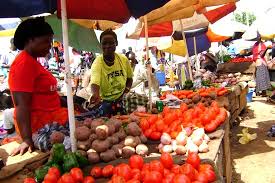Lagos, Feb. 6, 2024: Some traders have attributed the current hike in the prices of foodstuffs in Nigeria to the fluctuation in the foreign exchange market.
The traders on Monday in Lagos urged the government to arrest the situation.
Mr John Nwabueze, a trader at Alimosho, noted that foreign exchange is a major cause for the hike in the prices of most food items.
“The fluctuation in the foreign exchange rate can be blamed for this increase in the price of rice.
“Most foreign rice we buy in Nigeria come from the Benin Republic and the traders have to change the money to their currency which is currently stronger than ours.
“Rice trade mainly depends on the foreign exchange, so when it fluctuates, it affects the price.
“A bag of long grain rice now sells for N75,000 while short grain rice sells for N60,000 and Nigerian grown rice sells between N72,000 and N75,000 due to its scarcity in the market.
“A bag of yellow garri costs N26,000 and a paint bucket sells for N2,000 as against N1,000 as sold in January 2024.
“A bag of beans sells at N62,000 and a paint bucket at N4,500. The prices of beans and garri are not affected by the inflationary rates, but on logistic cost.
“Although sales have dropped, Nigerians still buy the quantity they can afford as they have to choose,” Nwabueze said.
On his part, Mr Samuel Osinachi, a trader at Agege, said the price hike was minimal in the condiments and spices section when compared with staple foods.
“We have witnessed little or no changes in the price of food spices and condiments.
“However, the food inflation cuts across all food types, we are not sure when there will be a hike. So, we just sell as much as we can afford based on the consumers demand.
“A bag of egusi (melon) now sells for N5,500 as against N4,000 per paint. The price of crayfish has been stable at N5,000 per paint for a month now. The price of dried pepper is relatively the same too,” Osinachi said.
Mrs Tolu Ajibade, a trader at the Ikeja area of the state, blamed some traders for the incessant hike in food prices.
“We all know that the fluctuation in exchange rate is a major cause for the hike in the cost of food prices.
“However, some traders for selfish gains use the opportunity to increase the prices of food items indiscriminately.
“Traders will definitely sell in such a way to make their profits. It is what we buy that we will definitely sell.
“The increase in the price of food items like garri and vegetables is largely related to the change in weather patterns.
“A lot of farmers have yet to harvest their cassava and with the harsh weather conditions, they can only work for limited hours.
“Also, due to the inability of early rains to commence, the ground is very hard for farmers to cultivate. Farmers cannot produce as much as they do, hence the price hike.




